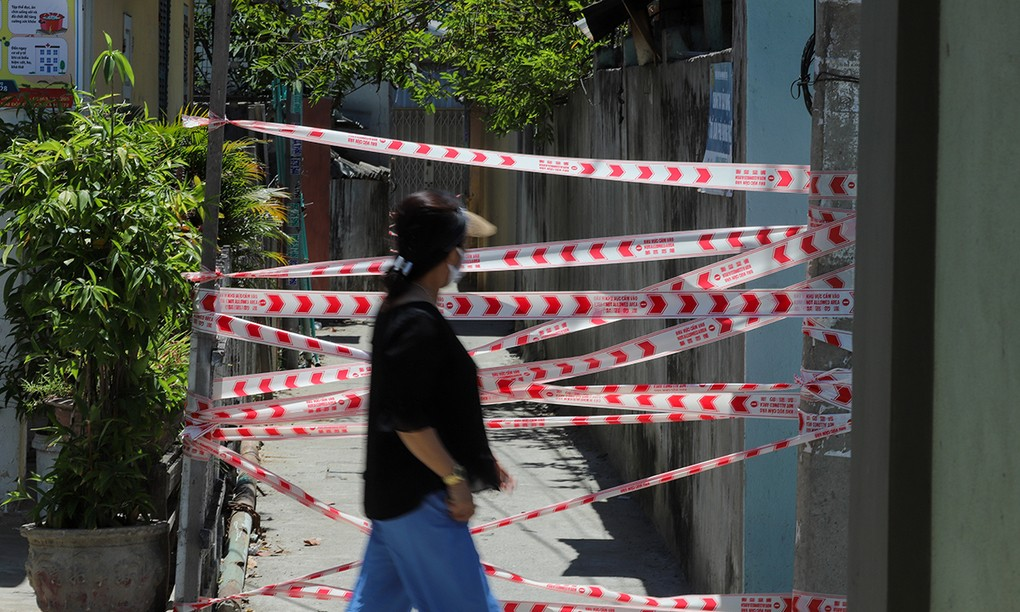Lungs damage from Covid-19 disease worse than the worst smokers's lungs
A Texas trauma surgeon says it's rare that X-rays from any of her COVID-19 patients come back without dense scarring. Dr. Brittany Bankhead-Kendall tweeted, "Post-COVID lungs look worse than any type of terrible smoker's lung we've ever seen. And they collapse. And they clot off. And the shortness of breath lingers on... & on... & on."
"Everyone's just so worried about the mortality thing and that's terrible and it's awful," she told CBS Dallas-Fort Worth. "But man, for all the survivors and the people who have tested positive this is — it's going to be a problem."
Bankhead-Kendall, an assistant professor of surgery with Texas Tech University, in Lubbock, has treated thousands of patients since the pandemic began in March.
She says patients who've had COVID-19 symptoms show a severe chest X-ray every time, and those who were asymptomatic show a severe chest X-ray 70% to 80% of the time.
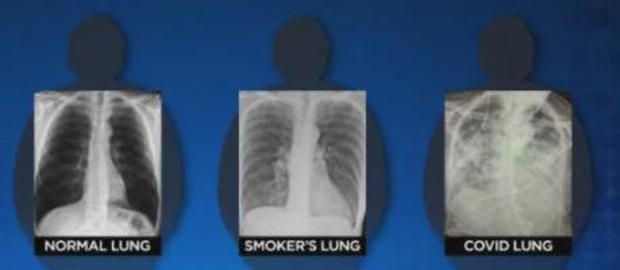 |
| X-rays of a normal lung, a smoker's lung and a COVID patient's lung. DR. BRITTANY BANKHEAD-KENDALL VIA CBS DALLAS |
"There are still people who say 'I'm fine. I don't have any issues,' and you pull up their chest X-ray and they absolutely have a bad chest X-ray," she said.
In X-ray photos of a normal lung, a smoker's lung and a COVID-19 lung that Bankhead-Kendall shared with CBS Dallas, the healthy lungs are clean with a lot of black, which is mainly air. In the smoker's lung, white lines are indicative of scarring and congestion, while the COVID lung is filled with white.
"You'll either see a lot of that white, dense scarring or you'll see it throughout the entire lung. Even if you're not feeling problems now, the fact that that's on your chest X-ray — it sure is indicative of you possibly having problems later on," she said.
Panagis Galiatsatos, M.D., M.H.S., is an expert on lung disease at Johns Hopkins Bayview Medical Center and sees patients with COVID-19. He explains some of the short- and long-term lung problems brought on by the new coronavirus, according to Hopkins medicine.
COVID-19, the disease caused by the new coronavirus, can cause lung complications such as pneumonia and, in the most severe cases, acute respiratory distress syndrome, or ARDS. Sepsis, another possible complication of COVID-19, can also cause lasting harm to the lungs and other organs.
COVID-19 Pneumonia
In pneumonia, the lungs become filled with fluid and inflamed, leading to breathing difficulties. For some people, breathing problems can become severe enough to require treatment at the hospital with oxygen or even a ventilator.
The pneumonia that COVID-19 causes tends to take hold in both lungs. Air sacs in the lungs fill with fluid, limiting their ability to take in oxygen and causing shortness of breath, cough and other symptoms.
While most people recover from pneumonia without any lasting lung damage, the pneumonia associated with COVID-19 may be severe. Even after the disease has passed, lung injury may result in breathing difficulties that might take months to improve.
Acute Respiratory Distress Syndrome (ARDS)
As COVID-19 pneumonia progresses, more of the air sacs become filled with fluid leaking from the tiny blood vessels in the lungs. Eventually, shortness of breath sets in, and can lead to acute respiratory distress syndrome (ARDS), a form of lung failure. Patients with ARDS are often unable to breath on their own and may require ventilator support to help circulate oxygen in the body.
Whether it occurs at home or at the hospital, ARDS can be fatal. People who survive ARDS and recover from COVID-19 may have lasting pulmonary scarring.
Sepsis
Another possible complication of a severe case of COVID-19 is sepsis. Sepsis occurs when an infection reaches, and spreads through, the bloodstream, causing tissue damage everywhere it goes.
“Lungs, heart and other body systems work together like instruments in an orchestra,” Galiatsatos says. “In sepsis, the cooperation between the organs falls apart. Entire organ systems can start to shut down, one after another, including the lungs and heart.”
Sepsis, even when survived, can leave a patient with lasting damage to the lungs and other organs.
Superinfection
Galiatsatos notes that when a person has COVID-19, the immune system is working hard to fight the invader. This can leave the body more vulnerable to infection with another bacterium or virus on top of the COVID-19 — a superinfection. More infection can result in additional lung damage.
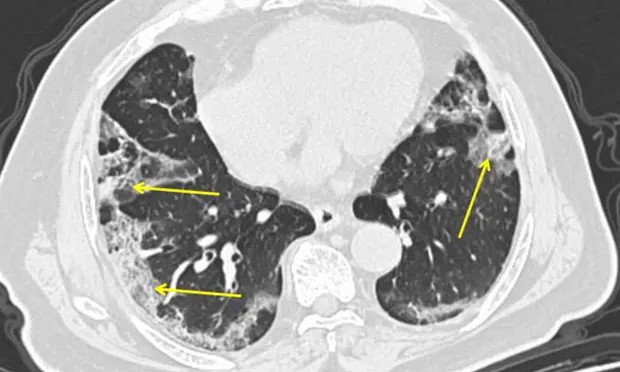 |
| Respiratory physician John Wilson explains the range of Covid-19 impacts. This image shows a CT scan from a man with Covid-19. Pneumonia caused by the new severe acute respiratory coronavirus 2 can show up as distinctive hazy patches on the outer edges of the lungs, indicated by arrows. Photograph: AP |
Dr. Amesh Adalja, an infectious disease expert and senior scholar at Johns Hopkins University Bloomberg School of Public Health, told CBSN that some patients with severe COVID-19 could feel the impact for years to come.
"When someone recovers from pneumonia, whether it's a bacterial pneumonia or a viral pneumonia, it's going to take some time for their chest X-rays to improve. Chest X-rays lag your clinical improvement. So you may be better, but your chest X-ray still looks bad," he said. "And we know that people with COVID-19 can get severe pneumonia, and some of that pneumonia will lead to damage to the lungs that will take time to heal. And some of it may be permanent."
He said the potential long-term health consequences are another reason people should take warnings about the disease seriously.
"It's not something you can blow off. This isn't something you want to have. Because even if you survive, you still may be left with some severe complications that make it very hard for you to go back to your baseline functioning."
Bankhead-Kendall said it's important that if you're experiencing shortness of breath after your COVID-19 goes away, you stay in touch with your primary care doctor.
She also points out, "There is no long-term implication of a vaccine that could ever be as bad as the long-term implications of COVID."
Can coronavirus patients lessen the chance of lung damage?
There are things patients can do to increase their chances for less severe lung damage, Galiatsatos says.
“If you have a health issue that puts you at higher risk, make sure you’re doing everything you can to minimize that. For example, people living with diabetes, COPD or heart disease should be especially careful to manage those conditions with monitoring and taking their medications as directed.”
Galiatsatos adds that proper nutrition and hydration can also help patients avoid complications of COVID-19. “Staying well fed is important for overall health. Proper hydration maintains proper blood volume and healthy mucous membranes in the respiratory system, which can help them better resist infection and tissue damage.”
Is COVID-19 lung damage reversible?
After a serious case of COVID-19, a patient’s lungs can recover, but not overnight. “Recovery from lung damage takes time,” Galiatsatos says. “There’s the initial injury to the lungs, followed by scarring. Over time, the tissue heals, but it can take three months to a year or more for a person’s lung function to return to pre-COVID-19 levels.”
He notes that doctors and patients alike should be prepared for continuing treatment and therapy.
“Once the pandemic is over, there will be a group of patients with new health needs: the survivors. Doctors, respiratory therapists and other health care providers will need to help these patients recover their lung function as much as possible.”
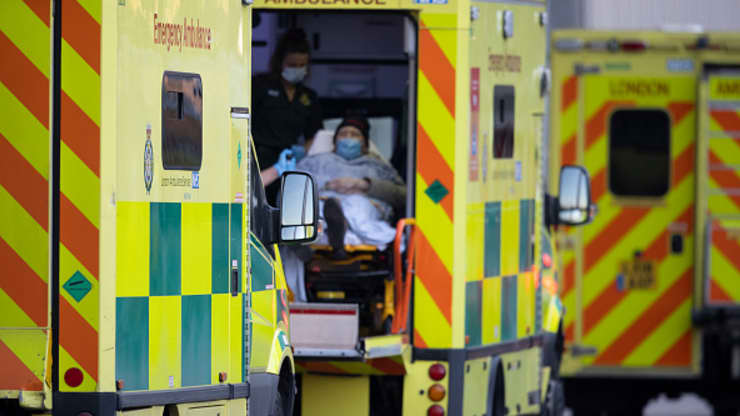 | Immunity will last roughly five months after Covid infection, new study shows in U.K In an early major study shown in U.K, patients who have been infected by Coronavirus will be granted immunity for at least five months. |
 | Update Covid-19 situation in Vietnam: the 32nd case confirmed On March 10 midday, Vietnam Ministry of Health announced one more patient tested positive for corona virus, raising Vietnamese covid-19 infection to 32 cases. |
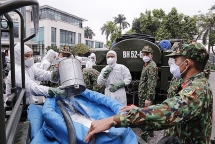 | Latest news Covid-19 in Vietnam: Chairman calls for calm Latest news Covid-19 in Hanoi, Vietnam, March 7: Sparks panic buying, Chairman Nguyen Duc Chung has asked residents not to panic, 25 people in contact with COVID-19 ... |
Recommended
 World
World
Thailand Positions Itself As a Global Wellness Destination
 World
World
Indonesia Accelerates Procedures to Join OECD
 World
World
South Korea elects Lee Jae-myung president
 World
World
22nd Shangri-La Dialogue: Japan, Philippines boost defence cooperation
 World
World
Pakistan NCRC report explores emerging child rights issues
 World
World
"India has right to defend herself against terror," says German Foreign Minister, endorses Op Sindoor
 World
World
‘We stand with India’: Japan, UAE back New Delhi over its global outreach against terror
 World
World

